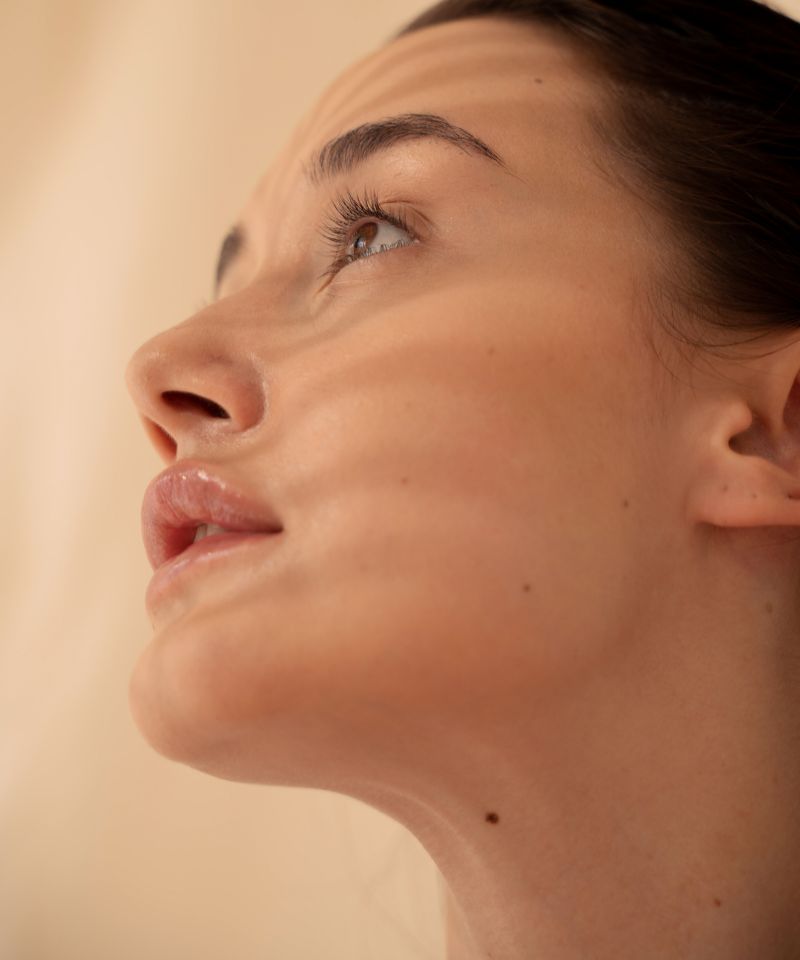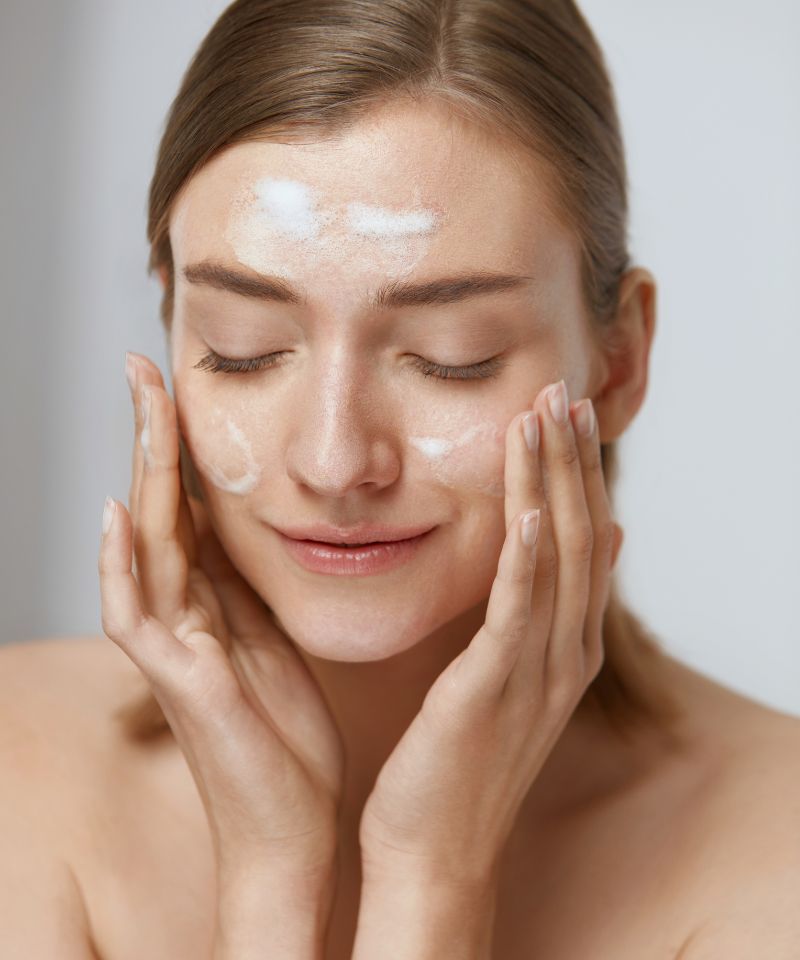If your skin tends to be drier, this is mainly because it lacks the natural oil secreted by our oil glands to keep it soft and supple.
Dry skin is a skin type that’s usually present since birth, and in most cases, it is hereditary.
However, the skin’s water-holding capacity can be disrupted by many factors and environmental conditions.
Therefore, in this article, we’ll look into the types, causes, and treatments of dry skin you should understand to keep your skin healthy and hydrated.

The 4 Types of Dry Skin on The Face
Dry skin can be seen in different face areas, including the forehead, eyes, nose, and cheeks.
It may appear red, flaky, and rough, with exacerbated pores, and is often followed by tightness, itchiness, and discomfort.
There are several types of dry skin caused by various factors and conditions.
Dermatitis
Dermatitis is an inflammation of the skin that can be caused by many different factors, including changes in temperature and exposure to irritants.
Dermatitis may take several forms, so it has different names based on the type and location where it flares up.
Perioral Dermatitis: A type of dermatitis that mainly affects the area around the mouth, exhibiting redness, flakiness, and peeling, and is usually caused by contact with an irritant, such as cosmetics.
Periocular Dermatitis: A type of dermatitis that affects the area around the eyes and exhibits redness along with a cluster of small, raised dots that may be flesh-colored or red and are usually itchy. Periocular dermatitis is generally caused by contact with an irritant, such as applying retinoids too close to the eye area.
Contact Dermatitis: A type of dermatitis that occurs when the skin is exposed to an irritant or allergen, such as latex or other chemicals found in beauty products. Contact dermatitis can flare up anywhere on the body, even if the primary contact with an allergen might’ve been in a different area.
Rosacea
Rosacea is a chronic skin condition that mainly affects the face and can cause redness, bumps, and patches of dry skin.
It is usually associated with enlarged blood vessels beneath the skin’s surface, which can lead to flushing and even tiny cysts or pimples.
Rosacea is often triggered by stress, hot drinks like caffeine, alcohol, and spicy foods.
Psoriasis
Psoriasis is an autoimmune disease that speeds up the growth cycle of skin cells, causing them to build up rapidly on the skin’s surface.
This accelerated process leads to the formation of dry, red, scaly patches that can be itchy and uncomfortable.
Psoriasis typically occurs in cycles, with flares lasting for weeks or months, followed by periods of remission or reduced activity.
The dry skin associated with psoriasis is primarily a result of the overproduction of skin cells before the old cells have had a chance to shed, creating layers of skin that are excessively dry and flaky.
UV Damage
UV exposure is one of the leading causes of skin damage and can significantly contribute to dry skin on the face. UV radiation penetrates the skin’s layers, disrupting the skin’s normal function and structure.
It depletes the skin’s natural hydration levels and impairs its ability to retain moisture, leading to dryness, roughness, and a damaged skin barrier.
Over time, UV exposure can also cause premature skin aging, including wrinkles, fine lines, and hyperpigmentation, further exacerbating dryness.
Symptoms of Dry Skin on The Face

The symptoms of dry skin can vary, but there are a few common signs to look out for.
Here are some of the most common symptoms of dry skin:
Rough, Scaly, or Flaky Skin: One of the most notable signs of dry skin is a rough, scaly, or flaky texture. This results from dead skin cells accumulating on the skin’s surface.
Itchiness: Dry skin can often be itchy, leading to discomfort, skin damage, and infections if the itchiness causes you to scratch.
Redness: Dry skin can become inflamed, leading to redness. This can be particularly noticeable on the face, where the skin is thinner and more sensitive.
Ashiness: Dry skin can also become ashy in color, with a dull or greyish hue. This is due to the lack of moisture in the skin and is usually accompanied by other symptoms, such as flaking.
Cracks or Fissures: Dry skin can crack or fissure in severe cases. These cracks can be painful and can lead to other skin problems if left untreated.
Tightness: This often occurs after washing the face. The skin may feel tight and uncomfortable, particularly after using harsh, stripping cleansers.
Dullness or Lackluster Appearance: Dry skin lacks the plump, hydrated cells that give skin a healthy, vibrant appearance. Instead, it can appear dull or lackluster.
If you notice any of these symptoms, it’s a good indication that you may have dry skin and should make certain changes that will relieve discomfort and help your skin look and feel healthier.
10 Common Causes of Dry Skin on The Face

#1: Genetics
Dry skin is a skin type that has been present since birth.
It’s an inherited characteristic, meaning that if one or both of your parents have dry skin, you may inherit the same trait.
This happens because specific gene mutations that control the production of components responsible for keeping the skin plump and hydrated, such as ceramide and hyaluronic acid, are passed down from parents to their children.
#2: Age
As we age, the natural lipid barrier of our skin (that keeps in moisture and keeps out harmful substances) begins to break down due to years of damage caused by environmental factors, poor diet, unhealthy lifestyle habits, etc.
Additionally, our skin’s ability to produce natural hydrating substances like ceramides and hyaluronic acid slows down over time.
Finally, the cell turnover rate also slows down with age, meaning dead skin cells stick around longer, causing a dry, dull appearance.
Combined, these factors contribute to the increased dryness we experience as we grow older.
#3: Impaired Skin Barrier
An impaired skin barrier is often a key contributor to dry facial skin.
Our skin barrier, also known as the stratum corneum, is the outermost layer of our skin. It acts like a wall, preventing the loss of water and electrolytes from our bodies while keeping out harmful substances like allergens, irritants, and pathogens.
When this barrier is compromised, whether due to harsh skincare products, over-exfoliation, environmental factors, or certain skin conditions, it can’t do its job effectively.
This results in transepidermal water loss, a fancy term that essentially means water evaporating from our skin into the environment.
Without enough hydration, our skin can become dry, tight, and flaky.
So, maintaining a healthy skin barrier is super important to keep your skin hydrated and glowing!
#4: Cold Weather
When temperatures drop, so does the humidity level, creating an environment that can seriously dry out your skin and lead to a condition known as winter xerosis.
Moreover, our blood vessels constrict in cold conditions to preserve body heat, reducing blood flow to the skin.
This can prevent essential nutrients and oxygen from nourishing the skin, leading to dullness and dryness.
#5: Dry Air
Similarly to cold temperatures, dry air can cause moisture levels to drop and our skin to become dehydrated.
The humidity indoors is often much lower than the humidity outdoors, mainly due to the presence of artificial heating systems like furnaces and air conditioners.
And, when we tend to keep the windows closed tight in winter, we’re stuck with dry air circulating throughout our homes.
Low humidity levels can also contribute to skin irritation, redness, and itching, which are symptoms of a compromised skin barrier.
#6: Hot Showers
Although a long, hot shower sounds like a luxurious dream in winter, decreasing your bath time is probably the right thing to do if your skin is already on the drier and more sensitive side.
Prolonged exposure of the skin to hot water can disrupt its moisture balance and rob your skin of the natural oils and fatty acids that prevent transepidermal moisture loss, which leads to hydration evaporating through the skin’s surface, and leaving your skin tight, stretched, and dry.
#7: Hard Water
While hard water isn’t necessarily a health risk, it can be harmful to the skin due to its drying and damaging effect on its moisture barrier.
Hard water contains high concentrations of minerals, such as calcium and magnesium, and even metals, like iron and zinc, and not the good kind we supplement with, but the kind that passes through pipes and deposits at the bottom of your bathtub.
These minerals can bind to the skin’s lipids and break them down, compromising your skin barrier and encouraging transepidermal water loss, which leads to dryness and irritation.
Also, because these minerals can accumulate on your skin and clog your pores, they can sometimes be the leading cause of breakouts and inflammatory skin conditions such as eczema.
#8: Drying Skincare Products
Using skincare products that contain drying ingredients, such as alcohol and astringents, or exfoliating excessively can be a huge contributor to skin dryness.
This occurs because components such as drying alcohol and exfoliating acids deplete the skin’s surface oil, a natural lubricant and skin protectant. This leaves the skin susceptible to transepidermal moisture loss.
Additionally, exfoliating acids remove the dead skin cells on the skin’s surface, which are part of our skin barrier, and prevent moisture loss due to being tightly packed together.
However, frequently removing these cells exposes the younger, immature cells underneath. These cells lack the protective lipids and proteins to shield the skin, leaving it vulnerable to dehydration and damage from external environmental elements.
#9: Certain Medications
Certain medications can also contribute to dry skin as they can cause dehydration, alter sweat and oil gland activity, or make the skin more susceptible to irritating, directly irritating it when exposed to the sun.
For instance, drugs like diuretics for high blood pressure promote water loss, potentially dehydrating the skin.
Additionally, some acne medications, such as Accutane, cause temporary skin dryness and sensitivity by shrinking the oil glands and drastically slowing down oil production.
Similarly, some cholesterol-lowering drugs, such as statins, also affect the lipids in your skin, which can cause it to feel dry, itchy, and irritated.
Therefore, if you’re on any medications and experiencing dry skin, it’s always worth having a chat with your healthcare provider or dermatologist about potential alternatives or solutions to manage this side effect.
#10: Health Conditions
Certain health conditions can also be the culprits behind dry, itchy skin.
Diseases such as hypothyroidism and diabetes can slow your body’s metabolism, reducing oil production and leaving your skin dry and irritated.
Skin disorders like psoriasis and eczema often come with symptoms of dry, irritated, and inflamed skin that can flare up during colder months or when in contact with an irritant.
Additionally, conditions that affect your body’s ability to stay hydrated, such as kidney disease or malnutrition, can also lead to dry and itchy skin.
Therefore, if your skin is unbearably dry and irritated, it might be a good time to talk to a doctor, as the issue might not always be superficial.
10 Easy Ways to Get Rid of Dry Skin

Use a Gentle Cleanser
Soaps containing fragrances, dyes, and other chemicals can irritate and dry the skin.
Therefore, if you are trying to nourish and hydrate your skin, opt for something gentle that is free of irritants, such as a non-drying and non-foaming cleanser that doesn’t contain fragrance, artificial colors, and any type of beads for manual exfoliation.
Some ingredients to avoid in cleansers when dealing with dry skin include:
Sulfates: Often listed as sodium lauryl sulfate or sodium laureth sulfate, harsh detergents can strip the skin of its natural oils, leading to dryness and irritation.
Denatured alcohols: Often listed as alcohol denat and methyl alcohol, which can be extremely drying to the skin and disrupt the skin’s lipid barrier.
Fragrances: Synthetic fragrances can contain up to 50 components, which can irritate the skin, trigger allergic reactions, and lead to permanent conditions such as contact dermatitis.
Apply a Hydrating Toner
A hydrating toner can balance the skin’s pH and restore lost moisture by infusing hydrating components into the deeper epidermal layers.
Additionally, toners also prep the skin to better absorb subsequent products, which allows actives to penetrate deeper into the skin and work more effectively.
Therefore, if you’re dealing with dry skin, opt for a hydrating toner that contains ingredients such as hyaluronic acid, glycerin, various glycols, propanediol, allantoin, and ceramides to help alleviate dryness, and leave your skin feeling refreshed and supple.
On the other hand, avoid toners that contain drying alcohol and irritating fragrance, as this will dry out your skin even more and compromise its barrier.
Exfoliate Weekly
Over-exfoliation can worsen dry skin. However, dry skin can also indicate that skin cells are not shedding adequately from the surface, resulting in a tightly packed layer that causes a dull, sallow complexion.
Therefore, to achieve healthy, glowing skin, you should exfoliate without overdoing it.
To do this, choose an exfoliating product that’s appropriate for your skin type, such as a gentle chemical exfoliant or a mild physical scrub, and use it no more than once or twice a week to slough off dead skin cells.
This exfoliating frequency will help ensure that your cell turnover and hydration levels remain balanced while leaving your skin smooth, soft, and healthy.
Use a Ceramide Moisturizer
A ceramide moisturizer is one of the most effective ways to combat dry skin.
Ceramides, naturally present in our skin, are lipids (fats) that maintain the skin’s barrier and keep it hydrated.
When your skin lacks ceramides, it can lead to dryness, irritation, and even inflammatory conditions such as eczema.
A ceramide moisturizer helps replenish these essential lipids, strengthening the skin barrier and locking in moisture from the outside.
Restoring the skin’s barrier reduces transepidermal water loss and prevents the skin from becoming dry, flaky, and irritated.
Wear Sunscreen
UV damage is one of the main causes of dry skin on face, as the sun’s rays can deplete the skin’s levels of fatty acids and compromise its protective barrier, leaving it looking and feeling rough.
Additionally, the heat caused by a high UV index can cause already dry skin to dry up further, giving it a rough, scaly, and flaky texture.
Finally, prolonged UV exposure can trigger conditions such as xeroderma pigmentosum in those predisposed to develop skin cancer, resulting in dry and severely sunburnt skin after sun exposure.
Therefore, to protect your skin from UV damage and reduce the risk of dry skin, always apply a broad-spectrum sunscreen with an SPF of at least 30 before heading outdoors.
Avoid Damaging Your Skin With Harsh Textiles
Vigorously wiping your face with rough towels, rubbing it with scratchy fabrics, and applying makeup with brushes that contain artificial fibers can be extremely damaging to the skin’s barrier.
These activities can not only leave the skin dry and irritated but can also cause inflammation, redness, and even breakouts, due to the disruption of its protective barrier.
Therefore, to avoid damaging your skin, you can leave it to dry naturally after having a shower or washing your face, or use softer fabrics such as bamboo or microfiber to pat your skin dry rather than rubbing it.
Use a Humidifier
A humidifier can add moisture to the air in your home, which can help prevent your skin from drying out.
This can be especially useful during cold winter months when the heating appliances in our homes are drying out the air and causing your skin to become dry, irritated, and sensitive.
Eat a Balanced Diet
Foods rich in omega-3 or omega-6 fatty acids, such as fish and walnuts, can help you maintain healthy skin and keep dryness at bay.
Fatty acids are a major part of our skin barrier, but our bodies can’t produce them on their own, so it is essential to include them in our diet.
These acids will help strengthen the skin barrier by promoting the formation of ceramides, which will act as a protective shield against moisture loss from the inside and the environmental aggressors that can dry out our skin from the outside.
Try Supplements
If you’re not getting enough essential fatty acids from your diet, you can try taking a supplement.
Fish oil supplements are rich in omega-3 and omega-6 fatty acids, which will help nourish and protect your skin from within.
Additionally, vitamin E is another fantastic addition to your daily supplement intake, as this antioxidant encourages wound healing by promoting ceramide production, making it fantastic for those dealing with excessively dry and cracked skin.
Finally, evening primrose oil in a supplement form has also been shown to relieve dry skin by up-regulating aquaporins, which are integral proteins that serve as channels in the transfer of water, and reduce the appearance of skin lesions in patients with eczema.
Avoid Alcohol
Alcohol is another major reason for dry skin for many who consume it excessively.
This is because alcohol is a diuretic, which means it helps you get rid of water through urinating, leading to increased water loss over time.
This can cause an imbalance in the body’s fluid levels, leading to dehydration that can manifest itself in various ways, including dry skin.
This diuretic effect of alcohol is further compounded by its ability to inhibit the production of an antidiuretic hormone (ADH) that helps the body reabsorb water.
So, when you drink alcohol, your kidneys are tricked into excreting more water than necessary, leaving less fluid available for the rest of your body, including your skin cells.
Furthermore, because alcohol depletes the skin cells of water, it can disrupt the skin’s barrier and make it harder for your skin to retain moisture.
This can lead to flakiness, dryness, and even symptoms of premature skin aging, such as lines and wrinkles.

My name is Simone and I am a certified skin specialist. I created this website to teach my readers how to take great care of their skin and I also like to occasionally share my honest opinions on skincare products I’ve tried. You can learn more about me here.
